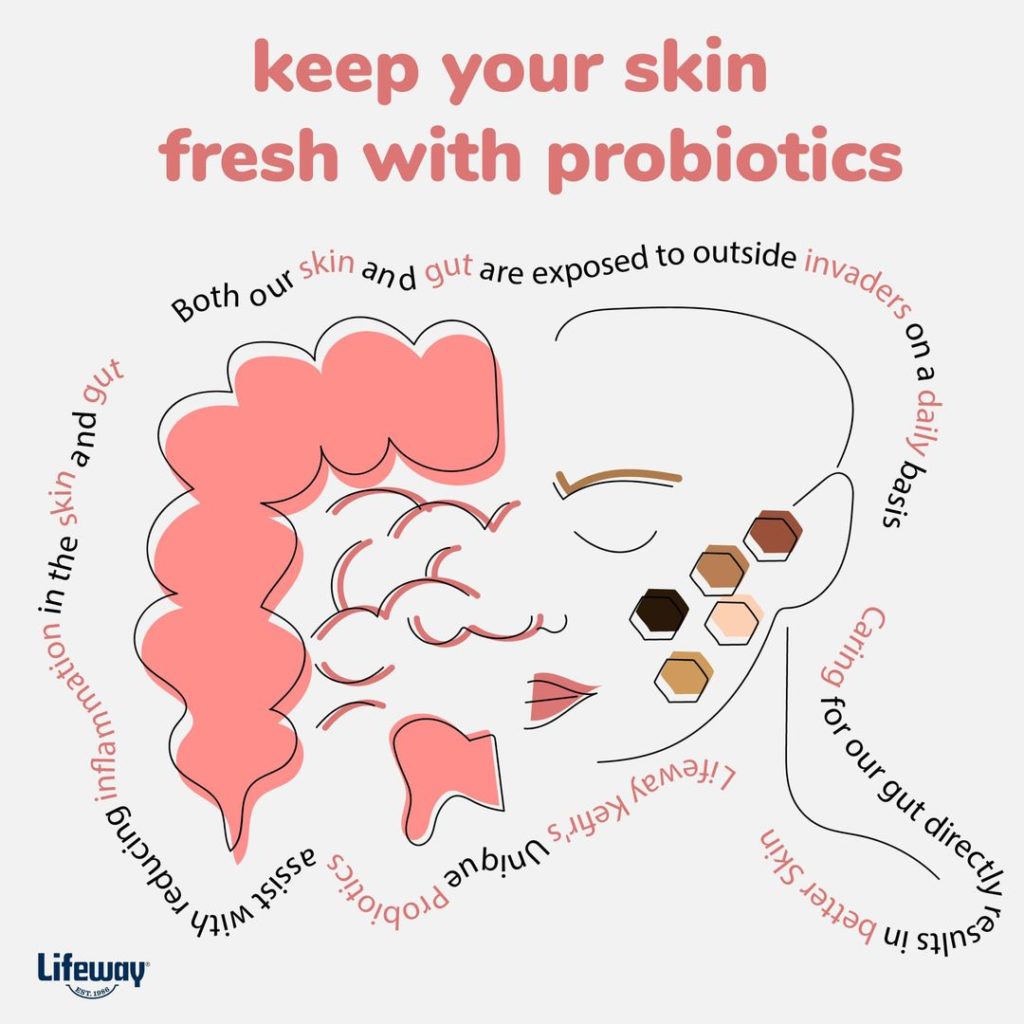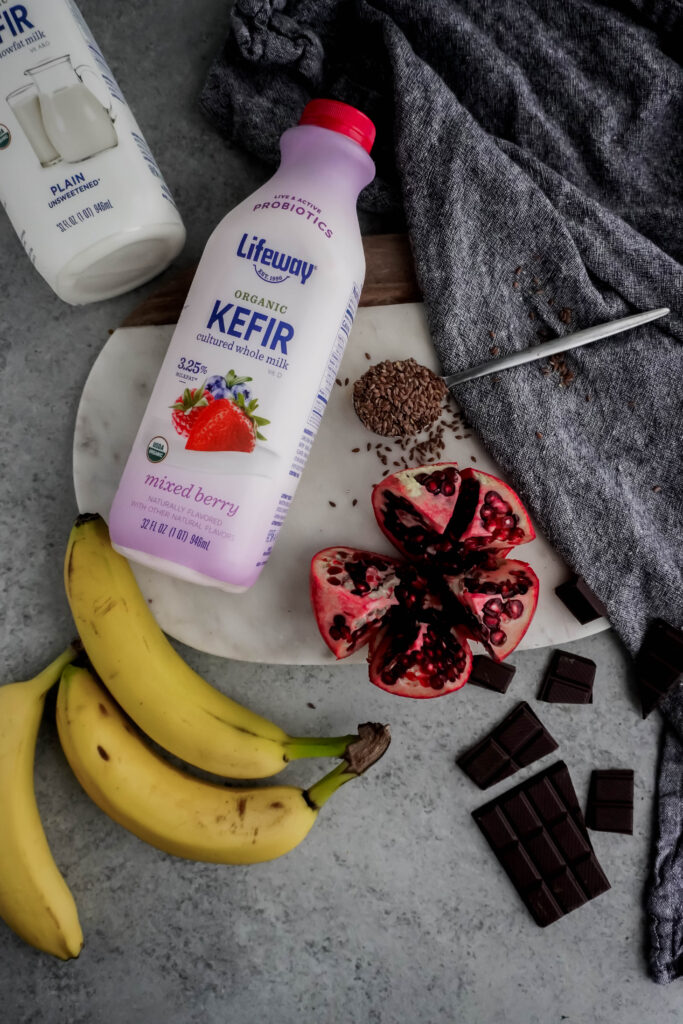Most of us already know of all the benefits of a healthy microbiome, from better immunity to better gut health and brain health. However, our skin is also a unique part of our microbiome and has an entirely different microbiota than that of our guts. In fact, our skin is the largest organ of our entire body and is the barrier and direct entry to the body’s internal organs. So what we put on our skin is vitally important to consider on a daily basis because it will and can quickly change and influence the entire makeup of our skin’s microbiota and therefore, affect the microbiota on the insides of our guts.

The Gut-Skin Axis is something more people are becoming aware of just like the Gut-Brain Axis because of this unique and important connection. The Gut-Skin Axis shows promising research on the benefits of probiotic foods and keeping our skin healthy and safe with these foods. So we wanted to take a moment and share 5 ways to keep your skin healthy and safe, and some things to consider next time you sit down for your next meal. We hope to inspire you to care for your skin with every single bite, just like you already do with your gut health!
1. How Healthy Foods (and Probiotic-Rich Foods) Benefit the Unique Microbiota of Our Skin
When we eat, probiotic-rich foods help protect our guts and skin from the effects of inflammation due to eating a diet high in processed and refined foods, foods excessively high in sugar, and those that contain chemicals and synthetic ingredients, which can all cause inflammation in the entire body. Changing our diets is one of the easiest and most effective ways to improve the look and safety of our skin as a result of positively influencing our skin’s microbiota as a result of eating well. Lots of colorful produce such as deep leafy greens, brightly colored red and orange fruits and vegetables, and an abundance of whole natural fruits and vegetables is one of the best ways to eat anti-inflammatory foods. Probiotic, fermented foods are also an important part of this since those probiotics help fight bad bacteria in the skin and gut that can lead to breakouts, rashes, skin allergies, and other skin issues. Even though our skin’s makeup of bacteria is different from that of our guts, when we eat things that positively influence one or the other, it’s natural that both will benefit from eating an anti-inflammatory diet.

2. Both Our Skin and Gut Are Exposed to Outside Invaders on a Daily Basis
Our skin is bombarded with an environment high in chemicals and other toxins, germs from others and things we touch, and bad bacteria of all kinds, so much so that it can get overwhelming if you focus too much on this. The main thing to remember is that caring for your skin externally with natural skincare choices and eating a diet high in anti-inflammatory whole foods, including probiotic-rich foods, are two of the most influential things you can do on a daily basis. When we expose our skins to these toxic invaders from our environments or an unhealthy highly inflammatory diet, our guts will directly suffer because of how they are connected. Remembering this with our daily choices can go a long way towards improving both our skin and gut health, not to mention our brain health. However, our diets can directly combat these effects so that they don’t affect our skin, guts, and immune systems as they would otherwise when they don’t have the protective benefit of these foods and a great skincare regimen.

3. Caring for Our Guts Directly Results in Better Skin
You might also notice when your digestion is better, so is your skin and there’s a good reason for that as we touched on above. Because our gut microbiota is so impactful at influencing our entire microbiome, including the microbiota makeup of our skin, we can notice a difference in our skin in just 24 hours as a result of eating well. Clearer skin, fewer rashes and skin allergies, and the natural glow of our skin can come with eating anti-inflammatory foods and probiotic foods because of the way these types of foods drastically feed the good bacteria in our entire microbiome, including our skin and guts. Starting your day with cultured foods is one of the easiest ways to make sure it gets done and can set you up for a whole day of brain, gut, and skin success!

4. Foods That Help With Gut Health and Skin Health
So what are some foods that help improve both skin and gut health directly? Specifically, anti-inflammatory foods include leafy green vegetables, such as spinach, kale, and arugula; brightly colored fruits rich in orange and red colors, including carrots, winter squash, sweet potatoes, red and orange bell peppers, strawberries, papaya, and cantaloupe; deeply colored blueish-purple vegetables and fruits such as eggplant, beets, blueberries, blackberries, acai fruit, cranberries, and purple cabbage; and even white and brown colored fruits and vegetables such as parsnips, daikon radishes, cauliflower, gold potatoes, bananas, pineapple, melons, and mango.
Omega-3 rich foods such as chia, flax, hemp, and wild-caught fish are other excellent anti-inflammatory foods to eat that fight the effects of aging, inflammation, skin allergies, and even support brain health. Natural, well-sourced healthy whole grains are another vitally important class of foods we should consider when caring for our gut and skin health. Oats and oat bran, quinoa, wild rice, buckwheat, millet, rye, brown rice, and fermented sources of rye and wheat (such as sourdough bread) are beneficial to our skins and provide many anti-inflammatory benefits that protect our hearts, along with a number of benefits they have on our gut health. Sprouted bread is another anti-inflammatory option that isn’t highly processed like regular bread and can benefit digestion and skin too. Also, don’t forget the importance of other healthy fats, such as avocado, almonds, and walnuts which are all anti-inflammatory and low in anti-inflammatory fats.
Fermented foods are also anti-inflammatory, with one of the most beneficial being kefir. Kefir, yogurt, and fermented cheeses are all beneficial dairy-based foods we can add to our diets due to the unique set of peptides and proteins rich in these foods that when fermented, act as anti-inflammatory agents. Kefir, yogurt, and fermented cheese all have their own set of unique bacteria (beneficial probiotic bacteria) that make them so healthy and protective against the effects of inflammatory agents. Adding a variety of each of these foods are just some of the first things you can do to combat the effects of inflammation that can weaken the health of your skin and guts, and even protect it from the sun during summer’s harsh summer sun rays.

5. How Kefir’s Unique Probiotics Can Assist With Reducing Inflammation in the Skin and Gut
Kefir, however, is unique from these foods because it has such a high and diverse set of synbiotic bacteria that aren’t found in regular yogurt and even fermented cheeses, with some exceptions. Lifeway Kefir contains 12 different strains of live probiotics that result in 25-30 billion units of these bacteria per serving. They work in harmony to provide our skin and guts with protective benefits that influence everything from our skin to our gut, brain, and immune system. Studies show that kefir helps protect the skin’s barrier by reinforcing the skin barrier that is vital to fighting off invaders our skin combats on a daily basis. We also provide an incredibly high-quality, probiotic-rich Farmer Cheese with 12 strains of probiotic cultures as well. The lactic acid that forms during fermentation of kefir also protects the mucosal layer of our guts that act as a “barrier” to our skin. Lactic acid also acts as a natural anti-inflammatory agent in the skin (which can reduce redness and breakouts).
Check out some of our favorite recipes with Lifeway Kefir below that are great starters to start nourishing your skin and guts! These have anti-inflammatory foods mentioned above and are super easy to start incorporating into your diets each day
Recipes to Try with Lifeway Kefir:

- Clear Skin Tonic
- Tangerine and Pineapple Sherbet
- Blueberry Pecan Overnight Oats
- Acai Bowl
- Pomegranate and Blackberry Smoothie Recipe
- Mango and Cabbage Salad
- Roasted Beet and Carrot Salad
Find Lifeway Kefir, Farmer Cheese, and our kid-friendly ProBugs in stores near you by checking our handy store locator so you can get in on these tasty recipes and experience the benefits of kefir, farmer cheese, and our cultured oat milk today. Or, just try out a new flavor. And check out more recipes here!